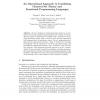115 search results - page 7 / 23 » Representing First-Order Causal Theories by Logic Programs |
ASP
2001
Springer
14 years 3 hour ago
2001
Springer
In this paper we present a framework for logic programming agents to take part in games in such a way that stable models of the system, the ones agreed upon by all the members, co...
PLPV
2009
ACM
14 years 4 months ago
2009
ACM
We propose a new way to reason about general recursive functional programs in the dependently typed programming language Agda, which is based on Martin-L¨of’s intuitionistic ty...
FUIN
2008
13 years 6 months ago
2008
Causal relations are present in many application domains. Causal Probabilistic Logic (CP-logic) is a probabilistic modeling language that is especially designed to express such rel...
AAMAS
2008
Springer
13 years 7 months ago
2008
Springer
This article introduces a new theory of intention representation which is based1 on a structure called a Dynamic Intention Structure (DIS). The theory of DISs was motivated2 by the...
TACS
1994
Springer
13 years 11 months ago
1994
Springer
Abstract. We have designed a programming logic based on an integration of functional programming languages with classical set theory. The logic merges a classical view of equality ...

